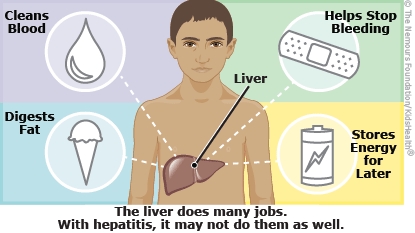Hepatitis A is when the liver gets infected by the hepatitis A virus and might not work as well as it should. The liver, an organ in the right upper abdomen, has several jobs, including breaking down fatty food, storing energy, clearing toxins from the blood, and making proteins that help blood to clot.
Besides problems with the liver, hepatitis A can cause flu-like symptoms, belly pain, nausea, vomiting, diarrhea, and jaundice (yellowing of the skin and eyes). Some people may have few or no symptoms. Even without symptoms, an infected person can pass the hepatitis A virus to others. The virus spreads through food and water, and on hands or objects contaminated with stool (poop).
The virus will go away without treatment, but it can take several weeks to 6 months.



Your child:

Your child:

What can protect others in the household from getting hepatitis A? The hepatitis A vaccine protects against the infection very well. Anyone who's been around your child and hasn't had the hepatitis A vaccine should get medical advice. Getting the vaccine or a special medicine right away might give them some protection against the virus. Regular handwashing and good hygiene help avoid spreading the hepatitis A virus and many other germs that cause illness.